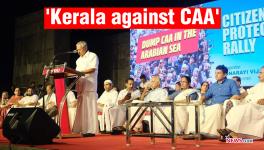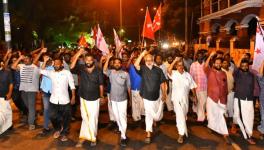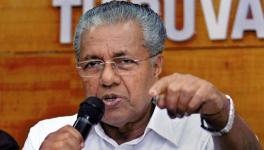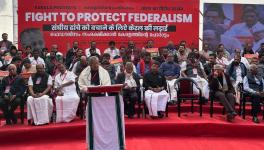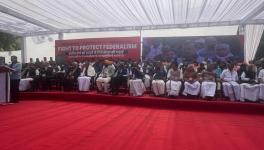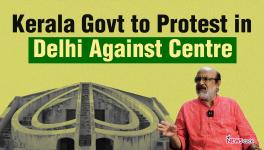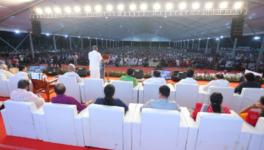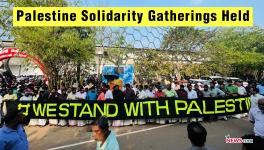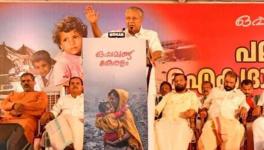Pinarayi Vijayan Reveals Kerala Model of Inclusive Policies in Reconstruction.
Kerala Chief Minister Pinarayi Vijayan explained the state's inclusive participatory action in the recovery and reconstruction processes during the recent floods in a speech at the World Reconstruction Conference (WRC) held at Geneva on May 13. Pinarayi Vijayan was an invitee to the conference to address the opening session as a representative of Kerala.
"The floods of 2018 brought the best of Kerala out. We supported each other in a spirit of brotherhood," Vijayan said in his speech. The Chief Minister of Kerala started his speech by describing the location of Kerala and its rich natural beauty. “As a landscape which doesn't have a recent history of handling calamities of significant magnitude, the state government and civil society faced a major challenge due to unprecedented floods," he added.
The floods which wreaked havoc in the state in August last year left around 453 dead and about 2,80,000 houses were damaged. Over 70,000 kms of road network suffered major damage. An estimated US$ 4.4. billion were required for the post disaster work.
Also Read: Inclusive Budget Proposes 25 Projects to Build ‘New Kerala’
According to the UN Space-based Information for Disaster Management and Emergency Response, the "WRC will be the first large-scale global conference focused on natural disaster recovery and reconstruction. It is anticipated that WRC and the Global Platform will bring together over 2,000 leaders, experts, policy makers, and practitioners, from government, international organisations, NGOs, academia, and the private sector from both developing and developed countries to collect, assess, and share disaster reconstruction and recovery experiences and take forward the policy dialogue for an effective international disaster recovery and reconstruction framework". The theme of the WRC this year was "inclusion for resilient recovery."
During the 10 minute speech at the Conference, Pinarayi Vijayan explained how the state government and civil society worked together during the recovery and reconstruction period. He also revealed the uniqueness of Kerala society by quoting the state's long history of reform movements and its secular fabric.
The major objective of the conference is identifying effective ways to ensure inclusive recovery and reconstruction process. The assessment based on the studies of various incidents carried by the WRC says that during the post disaster period there are chances for exclusion of various marginalised sections in the society.
The conference also called to assess how inclusive development policies work in the society, giving a chance to Kerala to reveal how their model of development helped in the recovery measures during the floods. During the devastating period, the government was able to use its strong institutional framework of decentralised governance. Appreciating the efforts of the fishermen during the floods, Pinarayi further said, "The fisher folk, who brave the sea for a livelihood deserve our special gratitude for their timely intervention, without it we would have lost many lives.” The rehabilitation packages mainly focused on fulfilling the basic needs, including timely provision of food and shelter to the least empowered sections of the society.
Also Read: Disaster Response: India’s Kerala Leads the Way
He also said that the youth and students worked hard during the period with great courage. The Kerala diaspora, aid agencies, civil societies, local government institutions and thousands of citizens worked unitedly during the period.
In the post disaster period, as part of the reconstruction mission, the government used its commercial banking sector and widely networked women self help group, Kudumbasree.
Pinarayi concluded his address by talking about the rebuild Kerala initiative which was launched with a vision of eco-friendly development strategy.
The first meet of World Reconstruction Conference was held in 2011, and the second and the third in 2015 and 2018, respectively. However, major natural calamities which occurred in different parts of the world during this short period of time led the organizers to conduct the WRC in 2019. In the past year, African countries, Mozambique, Malawi and Zimbabwe suffered major losses due to cyclones Idai and Kenneth. Iran faced a major crisis during the floods. Kerala was affected by a major flood; it had not faced any natural calamity of significant magnitude in the past 90 years. And, most recently, cyclone Fani, that hit Bangladesh and the eastern coast of India, had left several dead.
Asako Okai, Assistant Secretary General and director of United Nations Development Program crisis bureau says that, "The 4th WRC is a space for discussion and taking action to ensure support to recovery processes that are inclusive and participatory. To help countries and communities lead the rebuilding efforts to achieve their visions of resilient and sustainable development in line with 2030 Agenda, and the Sendai Framework."
In the recent past, there are many examples of people getting marginalised during the reconstruction period post disasters. A number of developing countries are facing this inequality due to inefficient reconstruction policies. One major example is from Nepal showed by the Post Disaster Needs Assessment by UNDP that "7,50,000 people went below the poverty line because of the earthquake”.
Get the latest reports & analysis with people's perspective on Protests, movements & deep analytical videos, discussions of the current affairs in your Telegram app. Subscribe to NewsClick's Telegram channel & get Real-Time updates on stories, as they get published on our website.









